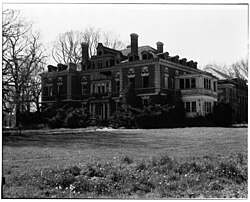Thomas Indian School
Thomas Indian School | |
 Thomas Indian School Administration Building, 1981 | |
| Location | NY 438 on Cattaraugus Reservation, Irving, New York |
|---|---|
| Coordinates | 42°32′22″N 78°59′48″W / 42.53944°N 78.99667°W |
| Built | 1900 |
| Architectural style | Georgian Revival |
| NRHP reference No. | 73001188[1] |
| Added to NRHP | January 25, 1973 |
Thomas Indian School, also known as the Thomas Asylum of Orphan and Destitute Indian Children, is a historic school and national historic district located near Irving at the Cattaraugus Indian Reservation in Erie County, New York. The institution was first established in 1855 by missionaries Asher Wright and his wife Laura Wright to house the orphaned and kidnapped Seneca children of the reservation under the federal policy of forced assimilation.[2] The complex was built in about 1900 by New York State as a self-supporting campus. Designed by the New York City firm Barney and Chapman, the campus contains the red brick Georgian Revival style main buildings and a multitude of farm and vocational buildings.[3]
It was listed on the National Register of Historic Places in 1973.[1]
Numerous works address the stories of former residents of Native American boarding schools in Western New York and Canada, such as Thomas Indian School, Mohawk Institute Residential School (also known as Mohawk Manual Labour School and Mush Hole Indian Residential School) in Brantford, Southern Ontario, Haudenosaunee boarding school, and the Carlisle Indian Industrial School in Carlisle, Pennsylvania; the impact of those and similar schools on their communities; and community efforts to overcome those impacts. Examples include: the film Unseen Tears: A Documentary on Boarding School Survivors,[4] Ronald James Douglas' graduate thesis titled Documenting ethnic cleansing in North America: Creating Unseen Tears,[5] and the Legacy of Hope Foundation's online media collection: "Where are the Children? Healing the Legacy of the Residential Schools".[6]
References
- ^ a b "National Register Information System". National Register of Historic Places. National Park Service. March 13, 2009.
- ^ Burich, Keith R. (2007). ""No Place to Go": The Thomas Indian School and the "Forgotten" Indian Children of New York". Wíčazo Ša Review. 22 (2): 93–110. doi:10.1353/wic.2007.0015. ISSN 0749-6427. JSTOR 30131236. S2CID 159954138.
- ^ "Cultural Resource Information System (CRIS)" (Searchable database). New York State Office of Parks, Recreation and Historic Preservation. Retrieved July 1, 2016. Note: This includes T. Robins Brown (December 1972). "National Register of Historic Places Registration Form: Thomas Indian School" (PDF). Retrieved July 1, 2016. and Accompanying five photographs
- ^ "Unseen Tears: A Documentary on Boarding School Survivors". Indian Country Today Media Network. December 2, 2010.
- ^ Douglas, Ronald James (2010). "Documenting ethnic cleansing in North America: Creating unseen tears (AAT 1482210)". ProQuest 757916758.
- ^ Legacy of Hope Foundation. "Healing the Legacy of the Residential Schools". Where Are the Children?.
External links
- Historic American Buildings Survey (HABS) No. NY-6012, "homas Asylum for Orphan & Destitute Indians, Route 438, Cattaraugus Reservation, Irving, Erie County, NY", 8 data pages
- HABS No. NY-6012-A, "Thomas Asylum for Orphan & Destitute Indians, Administration Building", 21 photos, 2 data pages, 1 photo caption page
- HABS No. NY-6012-B, "Thomas Asylum for Orphan & Destitute Indians, Dining Hall", 8 photos, 2 data pages, 1 photo caption page
- HABS No. NY-6012-C, "Thomas Asylum for Orphan & Destitute Indians, Dormitory", 6 photos, 8 data pages, 1 photo caption page




